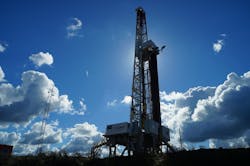A new study by researchers from Duke University found that the amount of water used for fracking in oil and gas wells increased up to 770% from 2011 to 2016. The study, published Aug. 15 in the journal Science Advances, also found that the volume of wastewater that fracked oil and gas wells created during their first year of production increased by up to 1,440% during the same time period.
“We clearly see a steady annual increase in hydraulic fracturing’s water footprint, with 2014 and 2015 marking a turning point where water use and the generation of flowback and produced water began to increase at significantly higher rates,” said Avner Vengosh, co-author of the study.
According to the Weather Channel, the Duke research team analyzed six years of data on water use in the oil and gas industries for more than 12,000 individual wells in all major U.S. shale gas and tight oil producing regions. They then used the data to model future water use and first-year wastewater volumes under two different scenarios. Overall, their models predicted a large increase in water use and wastewater production by 2030, up to 50-fold in unconventional gas-producing regions and up to 20-fold in unconventional oil-producing regions.
Moreover, the study noted the salts, toxins, organic matter and radioactive material in fracking-related wastewater poses a threat to drinking water supplies.


